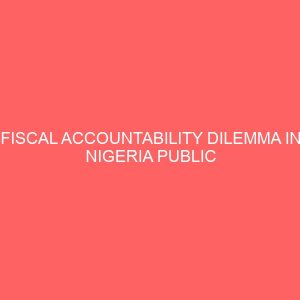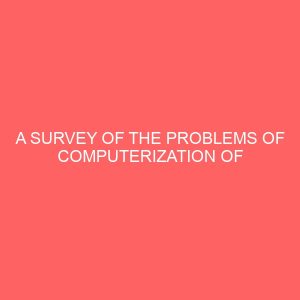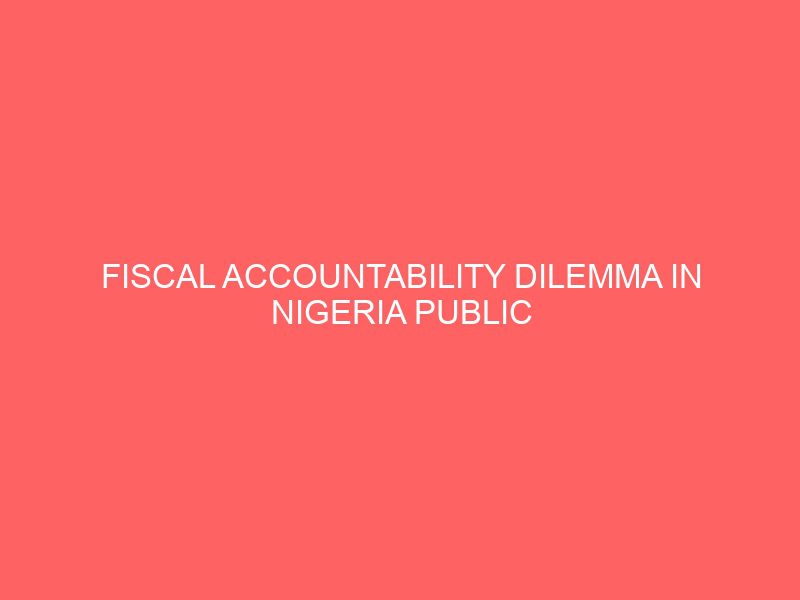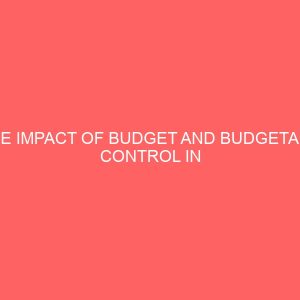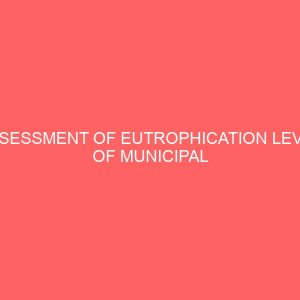Description
CHAPTER ONE
1.1 INTRODUCTION
This research is on Fiscal Accountability Dilemma in Nigeria Public Sector: A Warning Model for Economic Retrogression. Government exists to serve the needs of the citizens and ensure those needs are provided efficiently and effectively. It accomplishes these goals by providing clear processes and structures for all aspects of executive management (decision-making, strategic alignment, managerial control, supervision and accountability). Governance in both private and public arena has been a hot topic and now hotter due to various recent financial scandals. Citizens and regulators are calling for higher levels of transparency and accountability in all areas of business especially in public service. In a recent study, the World Bank found a significant relationship between good governance and high level of performance (Word Bank 1997). This generated the issue of using appropriate accounting method and today, many countries government are adopting accrual basis of accounting to improve governance and control which is a common practice in the private sector. Accountability is made possible when there is an established clear link between expenditures and performance. Accrual accounting helps agencies focus on outcomes and results rather than budgets and spending. Accountability is a concept in ethics and governance with several meanings and it is often used synonymously with such concepts as responsibility, answerability, blameworthiness, liability, and other terms associated with the expectation of account-giving. It stands out as a cherished goal of every civilized and well Statement of Research Problem constituted government all over the world. Accountability is increasingly being used in political discourse and policy documents because it conveys an image of transparency and trustworthiness (Bovens, 2006) and its evocative powers make it indescribable. Government is entrusted with public funds and other resources, and must adhere to the highest ethical standards, honesty, integrity, propriety and objectivity to ensure optimum utilization. These goals can be achieved only through a combination of individual professionalism, personal standards and a rigorous control framework. Openness and transparency help instill public confidence and trust, and are increasingly considered basic operating requirements for any government.
The diagnostic survey conducted in 2001 into the Federal Government) public procurement revealed that “Nigeria lost several hundred billions of Naira over the last few decades due of flagrant abuse of procedures, lack, of transparency and merit in the award of contracts in the public sector and accountability quandary (Uremadu, 2004). The problem of this research paper is based on the perceived weak accountability of government fund by public servants in Nigeria which has not only increased the height of corruption but also resulted in enormous waste of national resources and decay of economic infrastructure within the economy. Other problems include poor planning and implementation of national budget experienced in all facets of Nigeria public sector, lack of transparency leading to mistrust and other negative consequences, weak accounting infrastructure which may not support accountability of government funds and finally, all the above problems has created room for diverse economic disorder and resulted in under backwardness.
1.2 Research Objectives
The main objective of this paper is to investigate the extent of accountability in the public sector of Nigeria economy within 2006 and 2010 and to achieve this; the following will also be investigated:
- The relationship between existing accounting infrastructure and accountability in Nigeria
- The control parameters and oversight bodies established by the government and it is effectiveness
- The accountability regulatory framework within Nigeria public sector.
1.3 Research Question
- T o what extent is accountability institution working in the Nigerian public sector?
- Does professional base of Accountants exist in terms of number and quality that support public expenditure management in Nigeria?
- T o what extent has Nigeria government lost money due to lack of accountability?
- Does public resources managers in Nigeria rendered a timely, adequate and reliable stewardships accounting?
- Are the electorate satisfied with the state of public infrastructure and services compared with the amount of resources so far invested in the country?
- How effective and efficient is the audit process providing potential for establishing accountability and detection of corruption?
- Do competent oversight bodies exist and functioning effectively in the public sector?
- Does the accountability arrangement contribute to the availability of information about former and current administrative actions for the administrative body involved and a wider range of administrative bodies?
1.4 Research Hypothesis
In order to validate the above research questions, the following hypotheses shall be empirically tested using Pearson Product Moment Correlation:
Hypothesis (I)
Ho: There is no accountability of public fund in Nigeria public sector Hypothesis (II)
Ho: There is no significant relationship between accounting infrastructure and accountability in Public Sector in Nigeria.
Hypothesis (HI)
Ho: The Nigeria Economy is not developing due to financial indiscipline and wastages in the system resulting from lack of Accountability in Nigeria public sector.

